Iran Issues IDs For Over One Million Foreign Residents
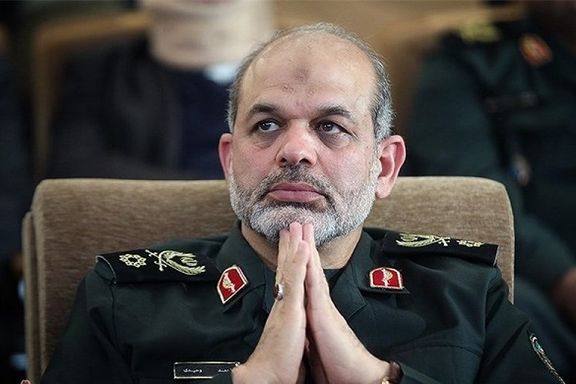
Iran's Minister of Interior has announced that more than one million ID cards have been issued to foreign residents with plans to include more.

Iran's Minister of Interior has announced that more than one million ID cards have been issued to foreign residents with plans to include more.
Ahmad Vahidi explained that rather than a national ID card like Iranian citizens, foreign nationals will be assigned an identification number that serves a similar function.
Iranian officials report that the country is currently home to an estimated five million Afghan residents, of which only 780,000 hold official refugee status, leaving the majority undocumented. Some estimates even suggest the Afghan population may be as high as eight million.
The rapid growth of the Afghan population in Iran has sparked contentious debate, with many fearing that the regime is trying to bolster support amidst rising discontent, offering incentives like subsidized energy and food.
The move could also be aimed at addressing concerns related to population decline or even to strengthen the proxies by recruiting young Shiite Hazara Afghans to the regime's forces.
Opinion is divided. Last month, lawmaker Mohsen Pirhadi stated, "The matter of Afghan migration to Iran should not be exclusively seen through a negative or problematic lens, nor should it be regarded as an undesirable social phenomenon."
According to the latest figures communicated by the Government of Iran to the UN's refugee commission (UNHCR), 762,000 refugees live in Iran, of which 750,000 are Afghans and 12,000 are Iraqis. Around 586,000 Afghan passport holders with Iranian visas also live in Iran.
The UNHCR claims that in 2022, the government of Iran undertook a headcount of all undocumented Afghan nationals in the country, including those who newly arrived following the Taliban takeover in 2021, through which some 2.6 million Afghans were registered. According to official figures from Iran, at least 500,000 undocumented Afghans did not participate in the headcount.

The outspoken leader of Iran's Sunnis, Mowlavi Abdolhamid, described Friday's mass arrest of 50 worshipers and citizens of Zahedan as "provocative."
The roundup of worshippers included 13 children and is part of a weekly system of oppression of the country's Sunni minority who see constant threats of arrest and even state sponsored violence.
The incident happened following last week's Friday prayer in commemoration of the lives lost last year in the Bloody Friday tragedy where state security murdered close to 100 civilians, including women and children.
"After Friday prayers, people should return to their homes with silence and remembrance of the Almighty ... but the extensive presence of forces on the streets surrounding the mosque and prayer ground further agitates the people," he said.
"When the youth see that the authorities have arrived in such numbers, it stirs up emotions ... but if these authorities were not present, there would be no problem."
Bloody Friday initially began with protesting worshippers gathering after a police commander sexually assaulted a young Baluch girl a few weeks earlier and resulted in one of the most bloody days of the uprising which followed the death in morality police custody of Mahsa Amini.
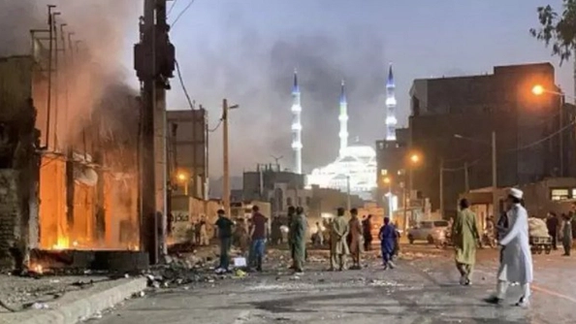
At that time, nationwide anti-regime protests were also taking place, following the death of Mahsa Amini in hijab police custody in mid-September 2022. The protests in Zahedan were seen by the regime as another serious challenge and they acted more brazenly than in Shiite cities, opening direct fire at protesters.
Abdolhamid also stressed that after more than a year, "no proper steps have been taken to heal the pains" of the families of the victims of Bloody Friday. "The greatest pain and distress of the people, whose family members were martyred on that fateful day in Zahedan on the 8th of Mehr, 1401, is that, unfortunately, no proper attention has been given to this matter, and no significant steps have been taken to address their suffering."
Since then, this Sunni-majority city has been a scene of week-round protests, which follow the sermons delivered by their Friday prayer leader, Mowlavi Abdolhamid.
The Sunni cleric stated that worshippers should return home "in silence and remembrance of God after Friday prayer"; however, the presence of security forces around the mosque is likely to exacerbate the situation and "provoke" people.
Videos posted on social media by the US-based Human Rights Activists News Agency (HRANA) show special guard forces surrounding the Makki Mosque and significant force used when arresting citizens in the city.
A number of activists and community leaders have expressed their support for the people of Zahedan, including Iran's exiled prince, Reza Pahlavi. He reacted to the incident Friday by blaming the regime for responding to "peaceful chants with a violent crackdown— including against children."
"The regime occupying our country is the godfather of terrorism in the Middle East," he wrote on X. "No Iranian, Israeli, or Arab will be safe as long as this criminal regime is in power. Lasting peace in the Middle East can come sooner than expected if the world takes real action to help the Iranian people overthrow this terrorist empire."
Moreover, Fazl ul-Rahman Kouhi, the Friday prayer Imam of Pashamag village in Sarbaz County, Sistan and Baluchestan, and a number of his companions were arrested by the security forces on Sunday after meeting Abdolhamid in Zahedan.
Kouhi, who was recently released after a long period of imprisonment, had said before his arrest in response to Friday's crackdown on protesters that "the attack of military forces on the worshipers in Zahedan is no less oppressive than the actions of Israel against the people of Palestine."
Friday protests in Zahedan were documented on social media, with slogans expressing opposition to Iran's current policy of supporting Hamas and Hezbollah. Participants chanted "Neither Gaza nor Lebanon, My Life for Iran" and "From Zahedan to Gaza, the Whole World Shakes."
Abdolhamid, renowned for his outspoken views, has expressed his criticism of Hamas' declaration of war against Israel on October 7. "We will not blindly support a Muslim who goes too far and ignores international law and attacks women and kills children," he said, going against the regime's rhetoric that Hamas must continue to crush Israel until it no longer exists.
His sermons were seen as an implicit reaction to Iran's Leader Ali Khamenei's lauding Hamas' "epic" attacks on Israel.
The Khamenei-affiliated Kayhan newspaper attacked Abdolhamid, calling him a "Mossad agent".
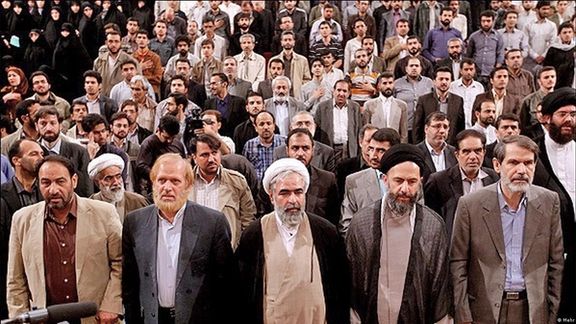
Leaders of Iran’s ultra-hardliner Paydari (Steadfastness) Party have been conspicuously silent about the war in Gaza despite being vocal about domestic issues.
The secretary general of the party, Sadegh Mahsouli, and the chairman of the party’s central council, Morteza Aghatehrani, have not made any public comments about the war raging in the Middle East. Considering that they are close allies with many top officers of the Revolutionary Guard, the reason for their silence remains a mystery.
The Paydari party has its tentacles in all government institutions including the parliament where their members form a very influential minority that often takes a leading role amid the weak presence of established conservative and reformist parties.
Paydari, which has always expressed maximum hostility towards Israel, however, in a statement earlier this month called the Hamas attack on Israel a “triumphant” operation and congratulated the “Palestinian resistance groups’ command”.
Mahsouli and Aghatehrani’s silence is particularly notable, as many other politicians -- including reformists such as the former President Mohammad Khatami whose rhetoric against Israel is generally very mild in comparison with hardliners -- have extensively condemned Israel in the past two weeks.
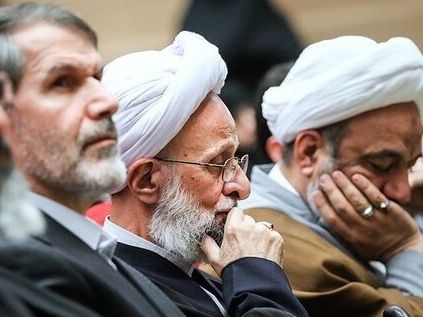
Mahsouli, a former Revolutionary Guard officer and a business tycoon who served in the government of the hardliner President Mahmoud Ahmadinejad as minister of interior and minister of welfare and social security, has been the party’s leader in the past three years.
Many believe Mahsouli, then interior minister, was the man behind the alleged rigging of the 2009 elections which secured a second term for the incumbent Mahmoud Ahmadinejad. He is among the officials of the Islamic Republic designated by the European Union.
Aghatehrani who is the chairman of the parliament’s cultural committee this week spoke to the media about the upcoming elections of the parliament and Assembly of Experts in March.
The Assembly, a constitutional body, is tasked with selecting the Islamic Republic’s next supreme leader. Reformists allege the party is planning to manipulate the assembly’s elections to suit its own interests.
Aghatehrani is known for having been a protégé of Ayatollah Mohhammad-Taqi Mesbah-Yazdi. The sixty-six-year-old cleric studied at Canada’s McGill; a university very popular with Mesbah-Yazdi’s circle in the early 1990s.
Aghatehrani then obtained a US Green Card while studying for a PhD in Middle East Studies at the State University of New York at Binghampton. There, he founded the Islamic Institute of New York and Razi Islamic school in Woodside.
Aghatehrani returned to Iran and to Mesbah-Yazdi’s famous Imam Khomeini Institute, a seminary in Qom, in 2004. A year later when Ahmadinejad was first elected to presidency, Aghatehrani was invited to join his government as the cabinet’s “ethics teacher”.
The party, and Aghatehrani as a lawmaker, are said to be behind a drive to purge government institutions of all rival factions and “Islamization” of the Iranian society including imposing tighter control on universities and other educational institutions, strict enforcement of compulsory hijab, and controlling the media and the cyberspace.
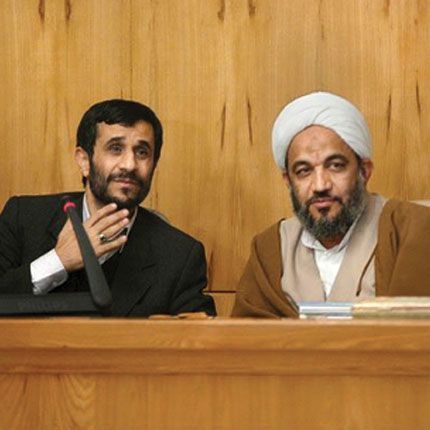
The drive to establish Paydari’s monopoly in the government and higher education came to be known as “the purification project.” Former parliament speaker and moderate conservative Ali Larijani, who among others oppose hardliners and are seen as centrists in Iranian politics, coined the term in May indirectly attacking the Paydari.
Paydari members had circulated a rumor that Larijani was trying to head an electoral block for the March parliamentary elections. “There is no talk about the elections or a nationwide slate, nor is there any consultation with other [political groups]. Therefore, the purification [-seeking] current need not worry,” Larijani responded in a brief letter and added that his ultra-hardliner rivals who blocked him from running in the presidential elections of 2020 could not expect to “create fake rivalry” and interest in the parliamentary elections.
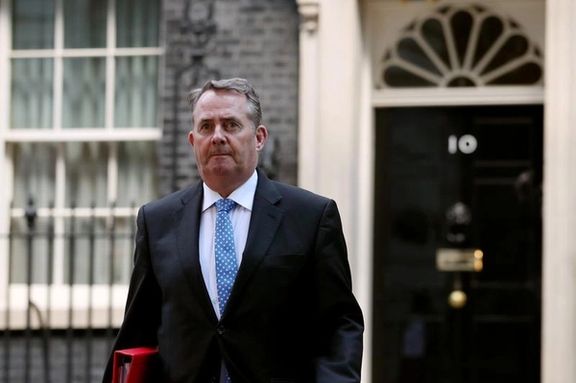
While Iran continues to deny its involvement, Liam Fox, the former UK defense secretary, has accused Iran of orchestrating its proxy Hamas's war on Israel.
"If the fingers on the trigger were Hamas’s, the strings were being pulled from Tehran," he said, calling for the UK to designate the Islamic Revolutionary Guards Corps (IRGC) which controls Iran's many proxies across the region.
The UK's counter-extremism commissioner, Robin Simcox, also had a similar stance, saying that continued legal support for the IRGC would not be sustainable. The IRGC has been designated as a foreign terrorist organization (FTO) by the US State Department since April 2019, but the UK has yet to do so.
Fox criticized the UK for failing to list the IRGC as a terrorist group, despite the fact that "£100 million of investment goes from Tehran to Hamas terrorists" annually and called for closing Iranian banks that operate from the City of London and stopping Iran Air flights from Heathrow.
The UK has imposed sanctions on Iranian individuals and entities since Mahsa Amini's death in September 2022 as a response to human rights violations committed by the regime's IRGC forces. But, proscription would have made belonging to the group, funding it, or expressing support for its activities in the UK criminal.
The British government exacerbated sanctions, pledging to step up protection for Iranian journalists based in the United Kingdom, following the suspension of Iran International's UK operations due to continued threats to its employees and based on advice from the London Metropolitan Police.
The Iranian government has repeatedly threatened Iran International and other Persian broadcasters based abroad.
The refusal to proscribe the IRGC has caused sharp political criticism, as the opposition Labour Party calls for its proscription under the 2000 Terrorism Act.
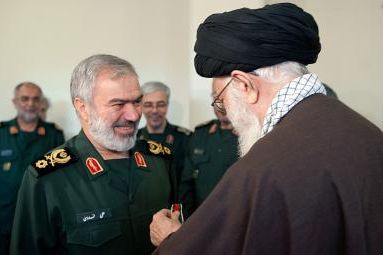
Ali Fadavi, the deputy commander of the IRGC, has joined regime threats of an offensive against Israel, naming the mixed city of Haifa as a target, where around 20 percent of its citizens are Muslim.
Though he asserted that the decision is not his to make, the talks of action on Israel's northern front, following Hamas' declaration of war against Israel on October 7, it will be further warning that all civilians in Israel remain at risk as Iran's largest proxy Hezbollah gears for war.
“Some consider a direct missile attack on Haifa to be the most practical course of action. We will carry out this task without hesitation if it is necessary and required," said Fadavi. "However, I am not the one who determines the assignment.”
He made the remarks at a gathering of students supporting Gaza at the Tehran University Mosque, though last week also threatened of “another shockwave” if Israel does not end "atrocities" in Gaza, referring to the bombardment of Israeli air strikes beating down on the strip after Hamas' massacre of Israeli civilians on October 7.
Since Hamas' surprise assault on Israel which saw over 1,400 civilians slaughtered by Hamas terrorists, plus hundreds more soldiers, Iran's threats did not outline a clear detailed plan of action. However, the acting IRGC Commander has stated a very direct warning on Israeli lands, threatening to activate its proxies not only on Israel's borders, but as far afield as Yemen. Just days ago, the US intercepted Houthi missiles from Yemen on their way to Israel, showing the Iranian proxy network is on full alert.
The Iran-allied militias have also begun attacking US troops' bases in Iraq and Syria as the conflict begun by Hamas spreads further afield.

Despite close political relations with China, Iran has been largely left out of Beijing’s Belt and Road Initiative and other regional investments, amid US sanctions.
China is connected to Southeast and South Asia, Central Asia, the Pacific Ocean, Africa, and Europe through the Belt and Road Initiative (BRI), a massive global infrastructural project. With the purpose of strengthening regional integration, expanding trade, and supporting economic growth, it is centered around five key goals: policy coordination, facility connectivity, unhindered commerce, financial integration, and people-to-people bonds.
Beijing held the third Belt and Road Forum for International Cooperation, marking the BRI's 10th anniversary, on October 17–18, 2023. The BRI Forum attracted international leaders of state and government, along with their delegations. As Xi Jinping's major foreign policy program reaches its second decade, over 20 heads of state, mostly from the Global South, convened to debate it. The gathering was smaller than in the past, but it still showed the initiative's importance in reshaping the world's political and economic landscapes.
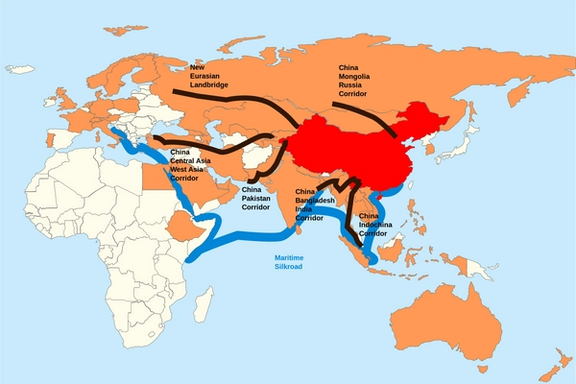
China investment on BRI
China started the $1-trillion Belt and Road Initiative (BRI) in 2013, with the participation of about 150 countries.
China itself, has directed $392 billion investments toward BRI, notably in Middle Eastern and Arab countries. However, it's crucial to emphasize the limited investments in Iran, which casts doubts on the implementation of the 25-year strategic partnership agreement between China and Iran, that Tehran has advertised as a major foreign policy achievement. The outcome and influence of this agreement on Chinese investments in Iran, especially in sectors as critical as infrastructure and energy, remain uncertain. The intricacies of this partnership will undoubtedly shape the geopolitical and economic landscape of the region.
According to data from the American Enterprise Institute, China's overseas investments from 2013 to 2023 amounted to a substantial $942 billion, of which $392 billion was related to BRI.
It has only signed two investment agreements with Iran during 2013-2023, of which one of them was canceled in 2018, when the United States left the JCPOA nuclear agreement with Iran.
One of the deals was investing in Iran’s South Pars gas field’s phase 11, which the Chinese CNPC energy company had committed in 2016 to invest $600 million but dropped the project in 2018.
The second scheme was the Gohardasht Steel project, which Chinese MMC had signed an agreement in 2014 to invest $350 million.
In contrast, Chinese enterprises have secured sizable contracts for investment and development with other regional nations. For instance, they have inked agreements with Saudi Arabia totaling up to $52 billion, with over $13 billion allocated for investment contracts.
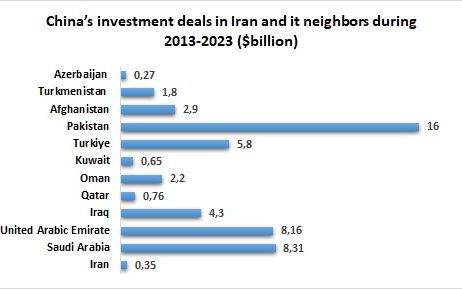
Iran remains out of transport corridors
Iran’s neighbor Iraq started a $17-billion road and rail project to link Asia and Europe in May 2023, while the India-Middle East-Europe Economic Corridor deal was signed in September 2023.
During last years, China has developed huge transport projects in Pakistan, while Central Asia-Caucasus-Turkey became the major land route for transportation cargoes in East-West direction.
Therefore Iran remained out of all transit projects in the region.
For instance, Azerbaijan has transited 7.5 million tons of foreign cargoes in 2022 through railroads - about 3.5 times more than Iran- of which 2.9 million tons was from East to West direction (China- Europe), about 15% more than 2021.
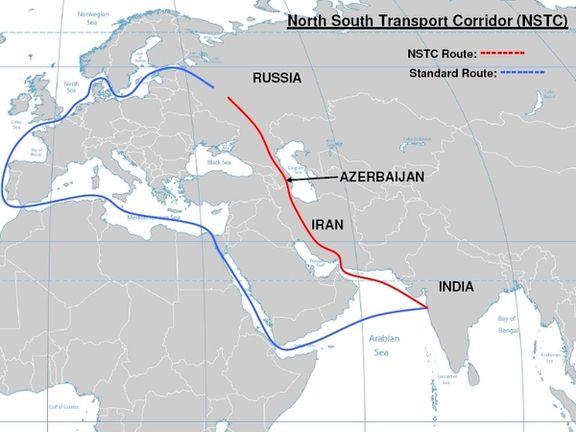
The country also expanded north-west (Russia-Turkey) and north-south (Russia-Iran) railroad transit routes. Its rail transportation from these routes increased 45% year-on-year as well.
Azerbaijan has also developed road and marine cargo capacities. Its marine cargo transit increased by 41% in 2022.
It also opened the Baku-Russia highway in October 2023. There is another transit road, inaugurated several years ago, connecting Baku to Astara in Iran.
Only using Azerbaijani rail lines, the transportation of products between Russia and Iran last year showed a phenomenal surge of 90%, reaching 1.7 million tons. Azerbaijan plans to increase cargo transit through North-East to 15 million tons annually via railroad, roads and the Caspian Sea.
Based on Iranian customs statistics, 57% of Iran's exports to Russia pass through Azerbaijani soil, while 42% traverse the Caspian Sea, mostly by Azerbaijani shipping lines.
Contributors:
Dr Umud Shokri, Energy Strategist
Umud Najjari, head of Iran news service at Azeri-Press Agency